Theses
- The era of cryptocurrency opens up new opportunities for publishers and game developers. However, the market is still underdeveloped, and there are many nuances that should be taken into account before entering it.
- Among the "minuses" there are regulatory risks (including laws against gambling), the "human factor" (ie, gamers who violate the rules of the game), the problem of security and the volatility of cryptocurrency rates.
- Among the "advantages": the independence of cryptocurrency from the economy of any country, a large market potential and a high level of control provided by the blockchain technology.
- In general, the situation is such that the disadvantages can turn into advantages if you apply a professional approach in the following areas:
- finding the right business model that, under existing laws, will provide a profit to the developer and be interesting to the players;
- finding the right technical solution that will provide security and allow you to control the economy of the game;
- organization of an effective system of rules of the game that will convince players to participate in the legal economy of the game.
When Bitcoin was first
released in 2009 , it was not perceived as a harbinger of global change in the global economic system. But, although the revolution did not occur with the advent of bitcoins and other cryptocurrencies, cryptocurrencies have become part of the evolutionary process of the world currency market. For 8 years,
cryptocurrencies occupied 0.1% of all global monetary transactions , which in fact is a fairly significant part: even the ubiquitous and growing yuan occupies only
1.78% in world payments. There are many reasons for this: cryptocurrency is an innovative payment method, transactions are decentralized and conducted within the virtual network, which makes them safer than many other payment methods and more independent than government currencies.

Today, the overall market capitalization of cryptocurrency is
growing rapidly . In 2017, it reached a
historic high of more than $ 200 billion, which is roughly equal to the GDP of some countries. And, although there are still many technical problems (mainly related to the blockchain protocol on which cryptocurrency is based), it is already clear that virtual currencies are changing the market and that, most likely, there is no turning back. The largest banks in the world organized
working groups focused on blockchain technology.
Developed countries, such as Switzerland and Japan, have
legalized cryptocurrencies, both as a form of ownership, and as a means of payment. Also, investors around the world have noticed the growth of a new segment. For example, in October 2017 more than
300 ICO (Initial Coin Offerings) took place simultaneously. And experts say that this is only the beginning: “I believe that there will be one or several digital currencies competing with fiat currencies as a means of payment, and this will come soon,” writes Asvat Damordan, professor of finance at NYU Stern in his
blog . There is evidence of this, for example, a growing number of international transactions that could be the driving force for the further development of the cryptocurrency segment: “To make a deal, you cannot just send an invoice in dollars,”
says Balaji Srinivasan , CEO and co-founder of 21.co - “ This requires an international currency. This may take some time, but over time the number of cross-border transactions will be higher than today. ”
This makes the cryptocurrency market attractive for investment - especially in technology.
One of the areas in which the era of cryptocurrency and blockchain has opened up new opportunities is the gaming industry. Games are a very stable segment, with a loyal audience of technically competent users. The market is growing due to the development of mobile technologies and the spread of the Internet - and therefore it is so attractive to investors. For developers and publishers of online games, the development of blockchain and cryptocurrencies made it possible to integrate cryptocurrency into the game's economy.
The interweaving of the real and virtual economy did not begin suddenly. The first attempts were made in the games
Entropia Universe and Second Life , where players were given the opportunity to exchange virtual currency for real (fiat) money.

Today there are already examples of companies that show that online games are becoming part of cryptoeconomics. For example, the Swiss company
EverDream Soft launched three MMO (Massively Multiplayer Online) games , where transactions are protected by the blockchain, and cryptocurrency is used as a means of payment when trading. One of the applications, the ORB project, allows players to exchange game money for other assets, including cryptocurrencies, and then exchange them for money. In the other two Spell of Genesis and Force of Will games, players use special Counterparty tokens, stored in a single wallet, for deals within both games.
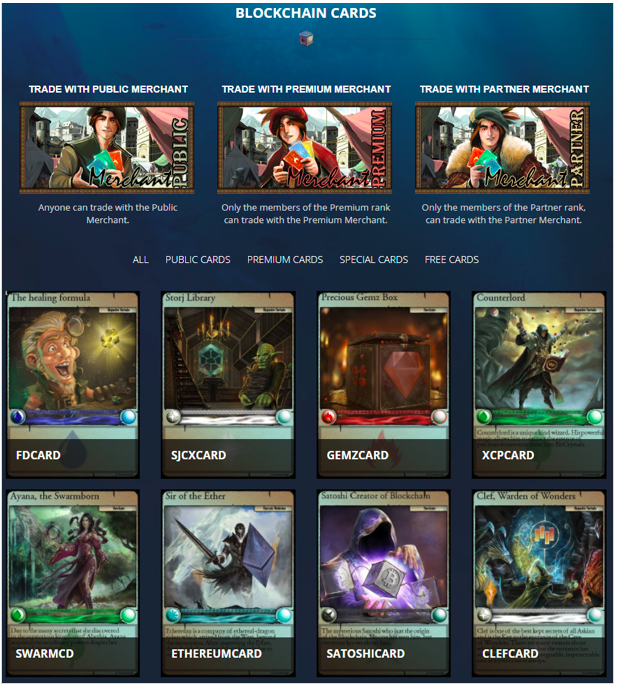
Another recently launched project -
Lordmancer II from Active Games , went even further and allows players to earn cryptocurrency by extracting game resources and items and trading them in the gaming market.
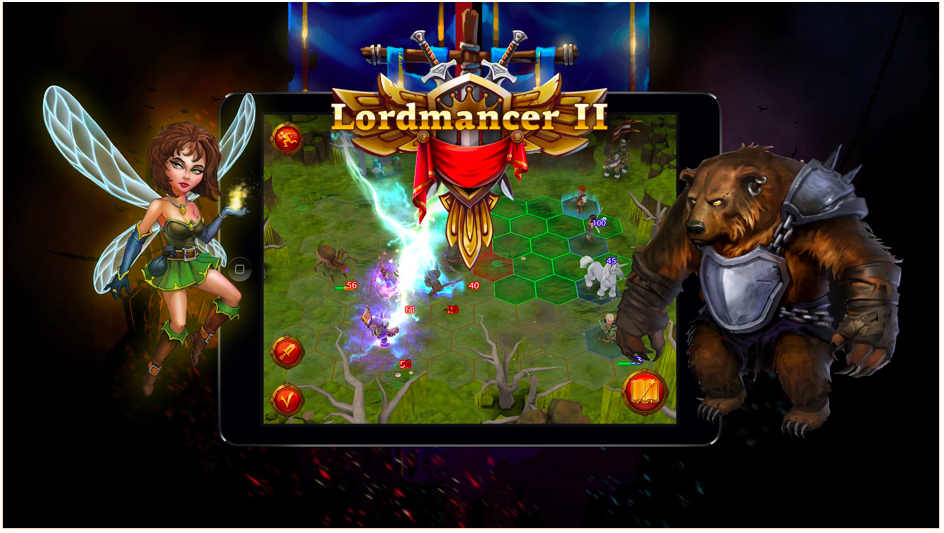
Particular attention is paid to the mobile games segment, which has shown significant growth in recent years: “The statistics of the number of installations and launches proves that applications are becoming increasingly important for people's lives, and this value is reflected in the growth of income for the industry. "-
says Matt Miller , an expert from App Annie, commenting on his report"
The Q3 2017 Recap "on consumer spending in applications. The figures in the report also look convincing: the total expenses in the iOS App Store and Google Play amounted to 17 billion dollars a year, and showed a growth of 28% year on year.
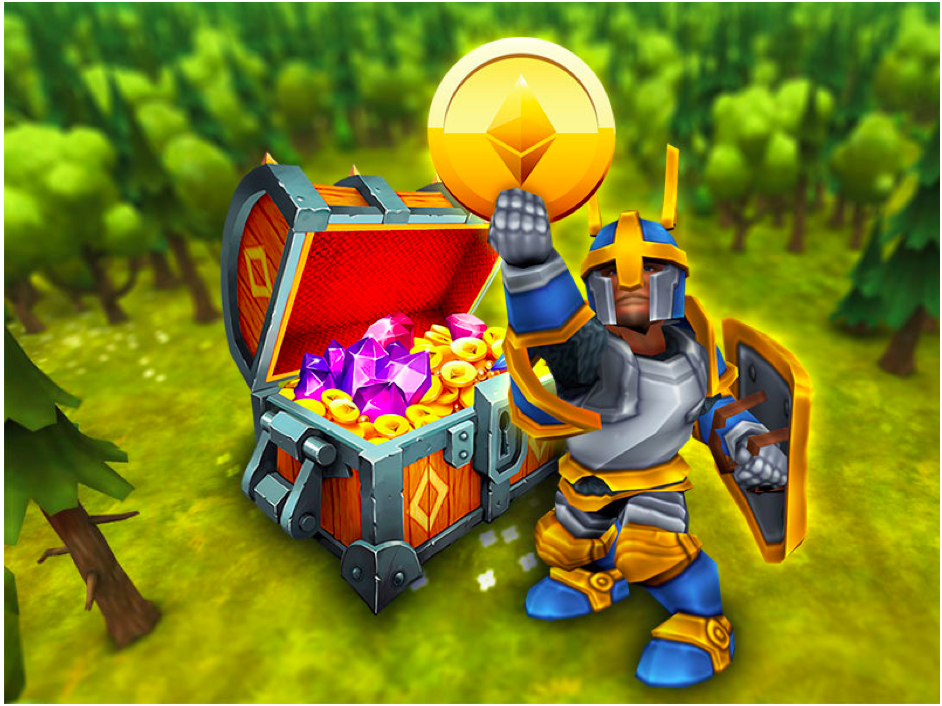
Meanwhile, the use of cryptocurrency in games has not yet become widespread: this segment is young and has a number of pros and cons. Let's look at the main arguments "for" and "against."
"Minuses"
Among the risks of using cryptocurrency in the IMO should be highlighted
legal issues. Until now, there are practically no laws regulating the use of cryptocurrencies that will ensure the operation of your business model and sufficient security. Attitudes toward cryptocurrencies
differ from country to country. The
Russian government is preparing a legislative framework for taxing cryptocurrency, the European Parliament has gone further and is developing rules aimed at identifying users of
cryptocurrency wallets and cryptocurrency exchanges to combat money laundering. In Germany, bitcoin can be legally used as a unit of account, and in
Switzerland, cryptocurrency is equal to foreign currency and can be exchanged at a certain rate. But in China, banks are not allowed to work with virtual money, despite the fact that this country is one of the main centers of
mining . Another major player, South Korea, has not yet finally decided on the legal status of cryptocurrencies, but government agencies pay special attention to organizations working with them.
So, if something happens - whether you are planning a new business model, starting a new project, etc., it is not easy to predict the legal reaction of the country. For example, the developer or publisher of a game can get into a difficult situation if the company allows the sale of rare items in a game for real money or
"Fiat" - such a game could be banned in South Korea for violating the laws against gambling. The same law effectively prohibits any form of gambling, auctions and roulettes within the game, where real money or cryptocurrency can be involved. Thus, such functionality as roulettes in Counter Strike will not work in South Korea and countries with similar gambling regulation.
In addition to ambiguous legal regulation, there are other problems. For example, the “human factor” - players are not yet accustomed to such game models of the economy and are not familiar with cryptocurrencies, so it is difficult to predict how people will behave in the new game economy, which includes virtual property. Today, not many games have found a successful model of monetization of the gameplay, in which operations with cryptocurrencies are involved. Blizzard Entertainment had once tried to allow trading in
gaming items and gold for real money, but did not find it profitable enough. Valve has included the ability to purchase rare items through
Steam officially, but this does not seem to give a significant income for the company.

They are also still pessimistic about working with cryptocurrency: “There are two related issues: one considers cryptocurrency as another type of currency that we support, and a broader monetary behavior in the game economy. The first question is mainly related to stabilizing cryptocurrencies for use as a unit of account. "- says Gabe Newell of Valve in the comments on this topic in
Reddit .
There are several reasons why cryptocurrency has not become a full-fledged part of the online gaming industry, and the players' reaction plays an important role here. The best way to give the player the opportunity to profit from virtual transactions and to provide an interesting and balanced gameplay has not yet been found. In addition, most modern business models that include monetization through virtual currency are inspired by the “black market”: most of the “new” services offered for purchase by virtual currencies are traditionally available on the “black market”. And, most likely, the black market “professionals” will find a way to enter the new economy. If players will be able to make a profit from the game or, all the more, mine cryptocurrency right in the game, then there is a danger that the game will attract many bot-guides, but will not be interesting for “non-professional players” who just want to enjoy the gameplay. This will lead to the destabilization of the gaming economy and make the idea of monetization very doubtful. In other words, since the market is relatively new, there are no well-thought-out business models that will most certainly work in a cryptocurrency market.
Another argument against the use of cryptocurrency in an MMO is related to the immaturity of cryptoeconomics. Cryptocurrency rate can change dramatically in one day for unclear reasons. For example, Ethereum and Bitcoin rates change to
20% in one day .

Also, an unpredictable rate cut can result in a large emission of cryptocurrency into the market. Moreover, despite all the security provided by the blockchain, cryptocurrency owners are still vulnerable to fraud. Speculations, as in the case of
Silk Road , can lead not only to the loss of money by many participants, but also significantly affect currency rates. Rumors and news affect the rates of these currencies, with greater consequences than fiat. One of the reasons is lower capitalization, which makes cryptocurrencies less stable and vulnerable to speculation. For example, the
ICO ban in China led to a decline in the Bitcoin rate of $ 1,000, so that in one day its price dropped from $ 5,000 to $ 4,000. Thus, before dealing with any financial issues related to cryptocurrency, you should think twice and analyze all possible risks that will allow the economy of your game to be stable regardless of currency fluctuations and attempts at abuse and fraud. In the end, any game that includes cryptocurrency must have very strong control over the economy.
In addition, there are still technical problems associated with the use of cryptocurrency. For example, there were problems with the loss of
ERC20 transaction tokens created on the Ethereum infrastructure, where the protocol had the opportunity to use the wrong function to transfer tokens and irretrievably lose them. However, most likely, these problems will be fixed during the update
Ethereum . Experts say that Bitcoin has some security issues: “Your private key must be protected, because if someone gets it, they can crack your account on bitcoin,”
says Jacqueline Shinfield , a partner in the Financial Services group. at Blake, Cassels & Graydon LLP, but according to her, these issues are controllable: “Among the many services that the exchanges provide is the storage of your private key,” Jacqueline continues. "Most exchanges have really safe procedures."
Many experts are still skeptical about the full development of this part of the economy. In fact, cryptocurrency platforms are still an awkward market tool. Firstly, the transaction price is very high - for example, the price per transaction in Bitcoin is now
close to 1 US dollar and is unlikely to be lower in the near future. Secondly, decentralized blockchain systems are very slow compared to other platforms. That is why it is not always possible to integrate blockchain elements into systems where performance is critical.
"Pros"
Nevertheless, many disadvantages can be turned into advantages if you take a responsible approach to the development of business models and monetization and make an accurate analysis that will protect against possible traps. All the nuances of modern cryptoreality can be used for the benefit of business.
As already mentioned in this article, the market is still practically unregulated, it is at the same time an opportunity. Some experts even compare the modern cryptocurrency market with the Wild West, especially when they talk about the ICO boom. “It can be said that the lack of regulation, a relatively short timeframe and significant investments made during the sale of tokens can create
a Wild West scenario compared to the traditional initial public offering,”
says Bob Graham , partner and head of digital currency services at Friedman LLP. However, the expert claims that the dangers that arise in a cryptocurrency ecosystem are not something specific: “Keep in mind that no matter what is said around, there will always be the possibility of theft or other targeted attacks, but this is not This is unique to the digital currency industry, as it is also common in other industries, ”says Bob Graham.
Since cryptocurrency is not considered a form of ownership or an asset in many countries, it is not subject to any taxes, this fact reduces the tax burden for both businesses and players. In addition, many of the limitations of gambling can be circumvented by inserting a third currency into the economic processes of the game. For example,
Lordmancer II has three types of “currencies” that are used in the gaming economy: Lord Coin (LC), which are crypto-tokens based on the Ethereum blockchain network, they can be exchanged on cryptocurrency exchanges and used inside the game to trade game values; gaming gold, which is used to buy basic gaming products and support players' motivation at each level of games and crystals, which are bought directly for fiat money through the App Store or Google Play.
The system seems cumbersome and complex, but each element is necessary to maintain the balance of the game and the interest of the players. This scheme follows the rules of app stores and does not use randomness and bets as game elements.
The fact that the cryptocurrency is not tied to any country also facilitates the process of its exchange for fiat money. The exchange can be made in any country where such exchange is allowed, and this country may differ from the country of the user's location. Another attractive feature is the privacy provided by blockchain technology - all transactions are completely anonymous, so no third party can track your actions and find out how much the user is earning.
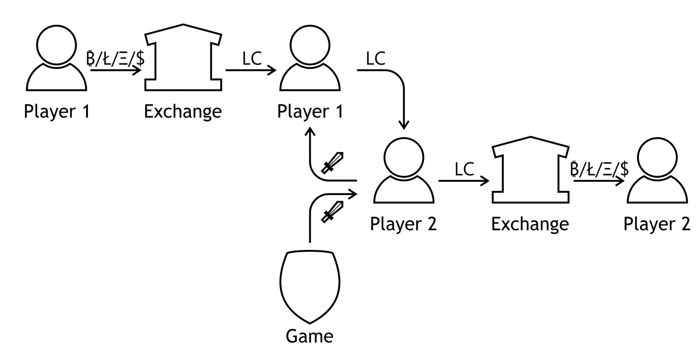
The “human factor” also has two sides. All actions on the “black market” that hit modern MMO games can actually turn into official activities and bring profit to the game developer or publisher — the key is finding the right business model for their monetization. If there is a demand for rare items or high-level characters, then he can be officially satisfied with the owner of the game, partner companies, or someone else who wants to invest in it. The main question here is how to keep all transactions under control so that the owner of the game gets a commission from all these transactions. In the aforementioned game project Lordmancer II, the means of payment for all such transactions is Lord Coin (LC). LCs are stored in a special Ethereum wallet, tied to a player account, all transactions and currency exchange are monitored and controlled by the developer. If a player decides to exchange his coins for another currency, he can do it out of the game using any available cryptobirth. This can be an effective model for protecting players' trading process and gaining additional profits from trading commissions.
An important point of the business model is the in-game economy. Particular attention should be paid to maintaining game balance. EverDream Soft's ORB Project allows other developers to create objects for the game and sell them through the Game Center.
The integrated system was also developed by Active Games in Lordmancer II. In order to maintain stable exchange rates in the game and to prevent the glut of the LC game market, 90% of them are burned when purchases are made within the game, and the remaining 10% go to Game Funds to fund current game operations. Another source of profit for the developer in Lordmancer II is a 20% commission from transactions between players, half of which also goes into Game Funds, and the remaining 50% are burned. All rare items will be created inside the game, and their initial distribution will be moderated manually to protect users from fraud and prevent imbalances in the game.
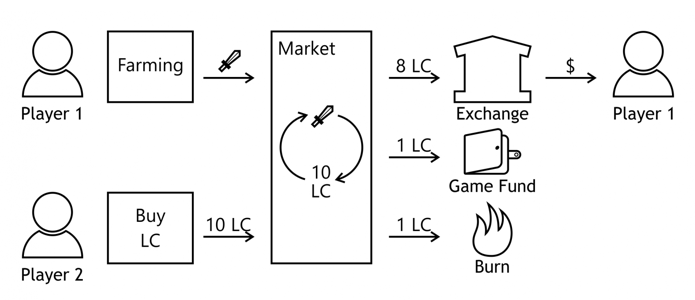
In addition to the laws of the gaming economy, you should also take precautions against botovodov, since they are still an economic and social threat in the game: bots produce cheap in-game currency and disrupt the gameplay of live users, invading generous gaming locations. Bots and alternative clients must be constantly detected and banned. Another effective way to deal with bots is to set limits on creating accounts for one person, including applying a monthly payment model.
And finally, the technical part. Yes, blockchain is not a very convenient technology for integration into the game, but it is not necessary. (, «Spell of Genesis» «Lordmancer II») .
, , , , . , Etherium Bitcoin
. , .
One of the big advantages of blockchain is also the impossibility of cashback operations, which is a very important function of fraud prevention.
, , . , , , , , , . : 2017 , , . , , . ,
Blizzard ,
Nintendo Valve , : Blizzard Destiny 2 Battle.net, Valve Dota 2 Steam, Nintendo . : ,
Norwegian Funcom The Secret World 2017 free-to-play , .
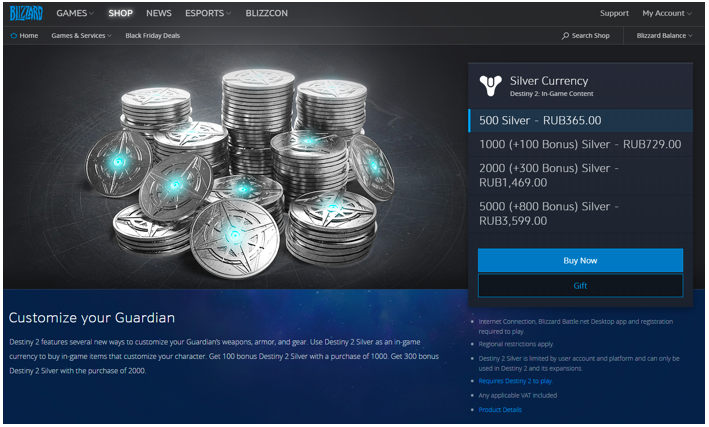
. , . , : , Big Fish, Microsoft, Green Man Gaming Jagex, -. « , - , , », —
, Jagex, , .
, , , . — , : , , , . , , . — , « », . , , . , , . — — . , , . , « », , - , , : , ( ) .
, , : , .
:
8- 8 . , . 2006 .